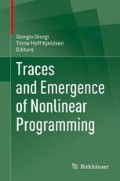Abstract
This paper deals with an extension of Lagrange’s multiplier rule to the case, where the subsidiary conditions are inequalities instead of equations. Only extrema of differentiable functions of a finite number of variables will be considered. There may however be an infinite number of inequalities prescribed. Lagrange’s rule for the situation considered here differs from the ordinary one, in that the multipliers may always be assumed to be positive. This makes it possible to obtain sufficient conditions for the occurence or a minimum in terms of the first derivatives only.
Access this chapter
Tax calculation will be finalised at checkout
Purchases are for personal use only
Preview
Unable to display preview. Download preview PDF.
Author information
Authors and Affiliations
Editor information
Editors and Affiliations
Rights and permissions
Copyright information
© 2014 Springer Basel
About this chapter
Cite this chapter
John, F. (2014). Extremum Problems with Inequalities as Subsidiary Conditions. In: Giorgi, G., Kjeldsen, T. (eds) Traces and Emergence of Nonlinear Programming. Birkhäuser, Basel. https://doi.org/10.1007/978-3-0348-0439-4_9
Download citation
DOI: https://doi.org/10.1007/978-3-0348-0439-4_9
Published:
Publisher Name: Birkhäuser, Basel
Print ISBN: 978-3-0348-0438-7
Online ISBN: 978-3-0348-0439-4
eBook Packages: Mathematics and StatisticsMathematics and Statistics (R0)

